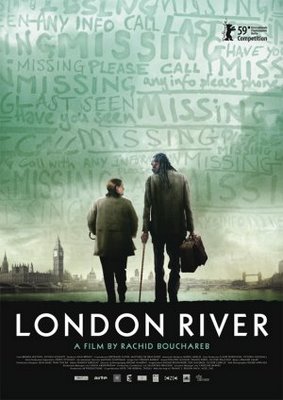
LONDON RIVER
France/UK, 2009, 87 minutes, Colour.
Brenda Blethyn, Sotiguie Kouyate, Sami Bouajila, Roschdy Zem.
Directed by Rachid Bouchareb.
Admirers of the fine World War II film about North African troops fighting beside the French, Days of Glory (Indigines), 2006, will be impressed by London River, which could not be more different. Bouchareb won a SIGNIS award for a film which is far more similar, action in both Africa and New York, Little Senegal (2001). London River won an Ecumenical Commendation in Berlin, 2009.
London River is presented very schematically. We are introduced to a farming woman on the island of Guernsey who is an 'on and off Protestant', Elizabeth Sommers (Brenda Blethyn at her best) and an elderly forester from Algeria who works in France and is a devout Muslim. The setting is London, July 7th, 2007, the day the suicide bombers blew up three trains in the Underground and a bus in Tavistock Square.
Ali Ousamane (Sotiqui Kouyate, winner of the Berlinale Best Actor award) comes to England to search for his son on behalf of his wife. He had left them in Algeria fifteen years earlier. Elizabeth Sommers keeps phoning her student daughter who does not answer. She goes to London.
The film shows Ousmane's quiet dignity and Elizabeth's bewilderment at finding her daughter lived in a Muslim section of London. The film brings the two together through police interviews, hospital searches. He receives help from a local mosque. She reacts awkwardly with Ousmane, visits the mosque and discovers her daughter was learning Arabic with Ousmane's son.
The audience realises before they do that the young man and woman are partners.
Whether the two were killed in the blasts or not, the importance of the film is in its inter-cultural drama, different races, different religions, different cultures and traditions, leading, of course, to mutual respect and understanding.
The performances are beautifully restrained with different intensities which cannot but touch audiences.
1.A film for understanding, racial understanding, cross-cultural?
2.The title, the London focus? The question of the river?
3.The Guernsey locations, the cliffs and the farm? The contrast with France, the forest, the forest paths? The musical score?
4.The structured parallels of the screenplay, comparing and contrasting the two characters and their worlds? The coming together of the son and daughter from each of these distinct worlds?
5.The daughter and the son, students, the revelation of their partnership, living, studying, going to the mosque, holidaying together?
6.Elizabeth, her background, the death of her husband in the Falklands war, her love for her daughter, her anxiety, the phone messages, going to London, discussions with her brother and looking after the farm? The address, her puzzle, the Muslim background, Arabic language, the shopkeeper and his kindness, pointing out the flat? Going to the police, registering a missing person, the police not able to do much? The visits to the hospitals? Her copying the photo of Jane, displaying it? The phone calls? The encounter with Mr Ousmane? Her shock, the fact that he knew something of her daughter? Her speaking French? Her reaction, phoning the police, suspicions? The beginning of some mellowing? Going to the mosque, discovering her daughter was having Arabic lessons with the young man? Going to the market, seeing Mr Ousmane? Their going to the morgue to identify the bodies? Beginning to talk, her apology? Her taking in Mr Ousmane? The shared house, the travel? The travel agent? The shock and grief of what had happened? The farewell to Mr Ousmane? Her return home, a changed woman, talking with Edward? Going to the cliff, contemplation, hoeing in the garden, life continuing? The important experience for her and the transformation?
7.Mr Ousmane, his age, dignity? His leaving Algeria fifteen years earlier, leaving his son aged six, leaving his wife? His work as a forester in France? Preserving the elms? His goal to find his son, boarding at the hotel, the encounter with the police, with Elizabeth? His dignity and her hostility? The visits to the hospital, the visits to the mosque? The imam and the information? The photo, the police, the morgue, the market? Her beginning to understand, her apology to Mr Ousmane? Going to the travel agent? Moving in? The different reactions to their children’s death, Elizabeth’s silence, Mr Ousmane singing? His return to France, the forests, the elms? Symbols of death and life in the forest?
8.In England, the variety of people, multicultural, Muslim, their appearance, the streets and shops, the buses, the police, the interviewer, the woman at the mosque, the imam, the shopkeeper?
9.The seventh of July, 2005, the inclusion of TV footage, the information about the bombers, the underground, Tavistock Square and the bus, the survivors? The visuals? Audiences reconstructing what happened? Mr Ousmane’s fear about his son? Elizabeth and her not thinking Jane would have been the victim?
10.The 21st century and bombings, in London, people’s response, British style?
11.The film as topical, reflective, a message against xenophobia, a message of hope, going beyond prejudices and cultural differences? The issue of religion, Elizabeth as an on and off Protestant, Mr Ousmane? as a devout Muslim? The dialogue between Christians and Muslims?